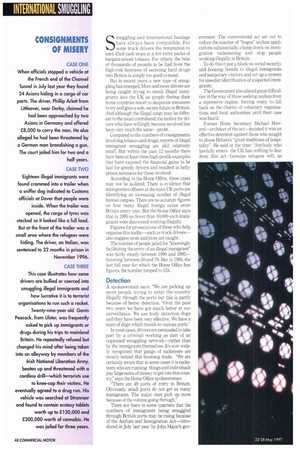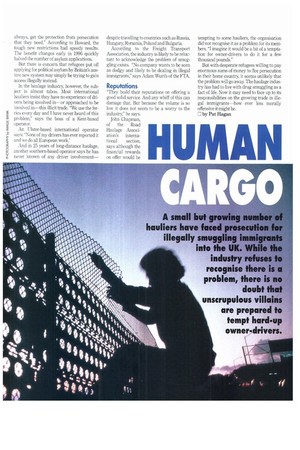S muggling and international haulage have always been compatible. For some
Page 50

Page 51

If you've noticed an error in this article please click here to report it so we can fix it.
truck drivers the temptation to earn illicit cash stops at a few extra packs of bargain-priced tobacco. For others, the tens of thousands of pounds to be had from the high-risk business of secreting hard drugs into Britain is simply too good to resist.
But in recent years a new type of smuggling has emerged, More and more drivers are being caught trying to sneak illegal immigrants into the UK as people fleeing their home countries resort to desperate measures to try and gain a safe, secure future in Britain. And although the illegal cargo may be different to the usual contraband, the motive for drivers who have willingly become involved has been very much the same—profit.
Compared to the numbers of consignments involving tobacco and drugs, reports of illegal immigrant smuggling are still relatively small. But within the past 12 months there have been at least three high-profile examples that have exposed the financial gains to be had for greedy drivers and resulted in hefty prison sentences for those involved.
According to the Home Office, these cases may not be isolated. There is evidence that immigration officers at the main UK ports are identifying an increasing number of illegal human cargoes. There are no accurate figures on how many illegal foreign exiles enter Britain every year. But the Home Office says that in 1995 no fewer than 10,000 such immigrants were discovered working illegally.
Figures for prosecutions of those who help organise this traffic—such as truck drivers– also suggest more and more are caught.
The number of people jailed for "knowingly facilitating the entry of an illegal immigrant" was fairly steady between 1990 and 1993— hovering between 30 and 70. But in 1994, the last full year for which the Home Office has figures, the number jumped to 124.
Detection
A spokeswoman says: "We are picking up more people trying to enter the country illegally through the ports but this is partly because of better detection. "Over the past two years we have got much better at our surveillance. We use body detection dogs and they have been very effective. We have a team of dogs which travels to various ports.'
In most cases, drivers are persuaded to take part by a criminal working as part of an organised smuggling network—rather than by the immigrants themselves. It's now widely recognised that gangs of racketeers are mostly behind this booming trade. "We are certainly aware that in some cases it is racketeers who are running things and individuals pay large sums of money to get into this couri try," says the Home Office spokeswoman.
"There are 49 ports of entry in Britain. Obviously, small ports do not get as many immigrants. The major ones pick up more because of the volume going through."
There are fears in some quarters that the numbers of immigrants being smuggled through British ports may be rising because of the Asylum and Immigration Act—introduced in July last year by John Major's goy
ernment. The controversial act set out to reduce the number of "bogus" asylum applications substantially, clamp down on immigration racketeering and stop people working illegally in Britain.
To do this it put a block on social security and housing benefit to illegal immigrants and temporary visitors and set up a system for speedier identification of suspected immigrants.
The Government also placed great difficulties in the way of those seeking asylum from a repressive regime, forcing many to fall back on the charity of voluntary organisations and local authorities until their case was heard.
Former Home Secretary Michael Howard—architect of the act—insisted it was an effective deterrent against those who sought to abuse Britain's "great traditions of hospitality". He said at the time: "Anybody who lawfully enters the UK has nothing to fear from this act. Genuine refugees will, as always, get the protection from persecution that they need." According to Howard, the tough new restrictions had speedy results. The benefit changes early in 1996 quickly halved the number of asylum applications.
But there is concern that refugees put off applying for political asylum by Britain's austere new system may simply be trying to gain access illegally instead.
In the haulage industry, however, the subject is almost taboo. Most international hauliers insist they have no experience of drivers being involved in—or approached to be involved in—this illicit trade. "We use the ferries every day and I have never heard of this problem," says the boss of a Kent-based operator.
An Ulster-based international operator says: "None of my drivers has ever reported it and we do all European work.'
And in 25 years of long-distance haulage, another southern-based operator says he has never known of any driver involvement—
despite travelling to countries such as Russia, Hungary, Romania, Poland and Bulgaria.
According to the Freight Transport Association, the industry is likely to be reluctant to acknowledge the problem of smuggling exists. "No company wants to be seen as dodgy and likely to be dealing in illegal immigrants," says Adam Wurth of the ETA.
Reputations
''They build their reputations on offering a good solid service. And any whiff of this can damage that. But because the volume is so low it does not seem to be a worry to the industry" he says.
John Chapman, of the Road Haulage Association's interna tional section, says although the financial rewards on offer would be tempting to some hauliers, the organisation did not recognise it as a problem for its members. "I imagine it would be a bit of a temptation for owner-drivers to do it for a few thousand pounds."
But with desperate refugees willing to pay enormous sums of money to flee persecution in their home country, it seems unlikely that the problem will go away. The haulage industry has had to live with drug smuggling as a fact of life. Now it may need to face up to its responsibilities on the growing trade in illegal immigrants—how ever less morally offensive it might be.
0 by Pat Hagan
















































































































